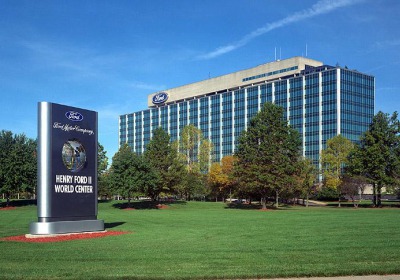Ford cuts CEO's compensation 37%
Wed, 25 Mar 2009Ford Motor Co. CEO Alan Mulally earned $13.57 million in total compensation in 2008, a 37 percent decline, as the automaker avoided seeking a federal bailout while posting a record loss.
Mulally will take an additional 30 percent cut in salary this year and next as he battles a global financial crisis and the worst U.S. sales climate in 27 years. His counterparts at General Motors and Chrysler, Rick Wagoner and Robert Nardelli, are getting a $1 annual salary while surviving on $17.4 billion on U.S. loans and seeking $21.6 billion more.
Ford is cutting the pay of its top executives to reduce costs and conserve cash "in response to the difficult global economic climate," according to a preliminary proxy filing with the U.S. Securities and Exchange Commission.
Mulally earned $21.67 million in 2007, his first full year after joining the automaker from Boeing Co. His cash compensation dropped 78 percent in 2008. He received $2 million in salary, unchanged from 2007, and no bonus, down from $4 million in 2007. He won't get a bonus this year.
Ford also said it will :
-- Eliminate 2009 merit increases for salaried employees in the United States and most other global markets.
-- Drop annual incentive compensation program bonuses for 2008 and 2009 for global salaried employees.
-- Provide no cash compensation to board members in 2009.
'Adverse impact'
"Ford is acutely aware that current economic conditions have had a significant adverse impact on our shareholders, customers, dealers, employees and other stakeholders," the company said.
"We do not view these actions as merely symbolic, but as a necessary step in the restructuring of our business in which all our stakeholders have been asked to participate."
Ford lost $14.67 billion last year, its third consecutive year without a profit. The company says it has enough cash to weather the downturn without turning to the U.S. for help.
Ford detailed the total compensation of five other top executives in addition to Mulally:
-- CFO Lewis Booth earned $4.74 million, down 54 percent. Booth's salary rose from $868,133 in 2007 to $1.08 million in 2008.
-- Mark Fields, president of the Americas, earned $4.83 million, down 42 percent. His salary rose from $1.26 million in 2007 to $1.3 million last year.
-- Jim Farley, group vice president of marketing and communications, earned $2.65 million. His salary was $700,000. Ford paid Farley, who joined the company from Toyota Motor Corp. in late 2007, a bonus of $660,000. That was part of the package to attract him from Toyota and offset the forfeiture of certain compensation there.
-- General Counsel David Leitch earned $2.62 million. That included $850,000 in salary and a $150,000 bonus related to a retention award granted in 2006.
-- Former CFO Don Leclair earned $3.20 million, down 73 percent. His salary fell to $875,000, from $1.01 million. Leclair retired in October.
Unusual
Ford said a preliminary proxy is required by the SEC this year because of an out-of-the-ordinary proposal to shareholders.
The company is seeking approval to issue common stock related to the recent UAW agreement on funding a retiree health-care trust. Ford needs that shareholder approval in order to proceed with plans to use company stock to fulfill up to 50 percent of its cash obligations to that trust, known as a Voluntary Employee Beneficiary Association, or VEBA.
Ford said New York Stock Exchange rules call for a company to get shareholder approval for a stock issuance that would total 20 percent or more of outstanding common stock. If Ford uses stock to meet 50 percent of the VEBA obligation, company officials estimate that the series of transactions would exceed that 20 percent threshold with just the first couple scheduled contributions.
The VEBA proposal is one of 11 on Ford's annual meeting agenda. At least two shareholder proposals call for Ford to rein in executive pay, including one that would limit compensation to $10,000 per week. Ford is opposing those proposals.
Another, repeated from past years, calls for the voting power of the Ford family's special shares to be reduced. Currently, 16 votes are allowed for each of the family's Class B shares. The Ray T. Chevedden and Veronica G. Chevedden Family Trust is seeking for that to be reduced to one vote per share.
The trust points out that approval for equal shareholder voting has increased in each of the last three years. Ford also recommends that shareholders vote against the proposal.
By Amy Wilson- Automotive News



